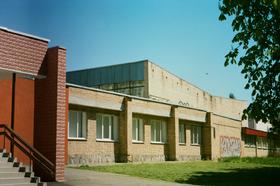For the 2025-26 school year, there are 5 public preschools serving 3,640 students in Boston, MA.
The top ranked public preschools in Boston, MA are Eliot K-8 Innovation School, Quincy Elementary School and Hurley K-8 School. Overall testing rank is based on a school's combined math and reading proficiency test score ranking.
Boston, MA public preschools have an average math proficiency score of 42% (versus the Massachusetts public pre school average of 36%), and reading proficiency score of 38% (versus the 37% statewide average). Pre schools in Boston have an average ranking of 5/10, which is in the bottom 50% of Massachusetts public pre schools.
Minority enrollment is 80% of the student body (majority Hispanic and Black), which is more than the Massachusetts public preschool average of 53% (majority Hispanic).
Best ºÚÁÏÍø¹ÙÍø Preschools in Boston, MA (2025-26)
School
(Math and Reading Proficiency)
(Math and Reading Proficiency)
Location
Quick Facts
Rank: #11.
Eliot K-8 Innovation School
(Math: 73% | Reading: 67%)
Rank:
Rank:
9/
Top 20%10
16 Charter Street
Boston, MA 02113
(617) 635-8545
Boston, MA 02113
(617) 635-8545
Gr: PK-8 | 792 students Student-teacher ratio: 13:1 Minority enrollment: 37%
Rank: #22.
Quincy Elementary School
(Math: 57% | Reading: 42%)
Rank:
Rank:
7/
Top 50%10
885 Washington Street
Boston, MA 02111
(617) 635-8497
Boston, MA 02111
(617) 635-8497
Gr: PK-5 | 733 students Student-teacher ratio: 11:1 Minority enrollment: 83%
Rank: #33.
Hurley K-8 School
(Math: 40-44% | Reading: 35-39%)
Rank:
Rank:
5/
Bottom 50%10
70 Worcester Street
Boston, MA 02118
(617) 635-8489
Boston, MA 02118
(617) 635-8489
Gr: PK-8 | 349 students Student-teacher ratio: 14:1 Minority enrollment: 78%
Rank: #44.
Match Charter ºÚÁÏÍø¹ÙÍø School
Charter School
(Math: 23% | Reading: 22%)
Rank:
Rank:
2/
Bottom 50%10
1001 Commonwealth Avenue
Boston, MA 02215
(617) 232-0300
Boston, MA 02215
(617) 232-0300
Gr: PK-12 | 1,185 student Student-teacher ratio: 10:1 Minority enrollment: 98%
Rank: #55.
Blackstone Elementary School
(Math: 8% | Reading: 6-9%)
Rank:
Rank:
1/
Bottom 50%10
380 Shawmut Avenue
Boston, MA 02118
(617) 635-8471
Boston, MA 02118
(617) 635-8471
Gr: PK-6 | 581 students Student-teacher ratio: 10:1 Minority enrollment: 96%
Boston, Massachusetts ºÚÁÏÍø¹ÙÍø Schools (Closed)
School
Location
Quick Facts
Dorchester Preparatory Charter School (Closed 2013)
Charter School
75 Pleasant St
Boston, MA 02108
(617) 680-7830
Boston, MA 02108
(617) 680-7830
10 Fenwood Rd
Boston, MA 02115
(617) 635-8450
Boston, MA 02115
(617) 635-8450
Gr: K-5 | 205 students Student-teacher ratio: 12:1 Minority enrollment: 97%
Young Adult Center (Closed 2006)
Alternative School
Suffolk Superior Court-rm 705
Boston, MA 02108
(617) 725-8133
Boston, MA 02108
(617) 725-8133
Gr: 11 | 1 student
Frequently Asked Questions
What are the top ranked public preschools in Boston, MA?
The top ranked public preschools in Boston, MA include Eliot K-8 Innovation School, Quincy Elementary School and Hurley K-8 School.
How many public preschools are located in Boston?
5 public preschools are located in Boston.
What is the racial composition of students in Boston?
Boston public preschools minority enrollment is 80% of the student body (majority Hispanic and Black), which is more than the Massachusetts public preschools average of 53% (majority Hispanic).
Which public preschools in Boston are often viewed compared to one another?
Popular comparisons of public preschools in Boston include: Quincy Elementary School vs. Eliot K-8 Innovation School, Blackstone Elementary School vs. Quincy Elementary School, Eliot K-8 Innovation School vs. Quincy Elementary School
Recent Articles

Texas Schools Enrollment Trends & Policy in 2025
Latest data and policy changes on Texas public school enrollment growth, funding, and virtual education in 2025.

Financial Aid & Hidden Costs in ºÚÁÏÍø¹ÙÍø Schools
Learn about financial aid and hidden costs in public schools. Discover what parents should budget for beyond tuition-free education.

NYC Schools Still Most Segregated in 2025
Despite reforms, New York City schools remain the most segregated in the U.S. in 2025. Here’s what parents and educators need to know.
